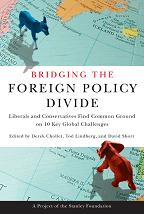Bush Administration Confirms What We Knew All Along
Posted by Patrick Barry
Thanks to stalwart intern Will Rosenzweig, who picked up on this oh-so-telling Dana Perino gaffe:
On the heels of this morning’s story in the New York Times that the Bush Administration has been grossly negligent in its pursuit of Al Qaeda in Pakistani tribal areas and weak-kneed in pushing Pakistani President Pervez Musharraf to pull his weight in attacking al Qaeda and Taliban outposts, comes this gem from White House Press Secretary Dana Perino:
“The President has been looking for Osama Bin Laden since September 12th.”
Call me crazy, but shouldn’t Bush have been looking for Bin Laden on say, January 20th, 2001, the day he took office? Perino basically admits that for nearly nine months the administration ignored the significant threat that Bin Laden and Al Qaeda posed to America. This admission is unsurprising and yet stunning at the same time. It’s unsurprising because we’ve long known that the Bush administration repeatedly ignored the warnings of Richard Clarke about the need for a war room to track Bin Laden and Al Qaeda leads.
But Perino’s comment is also stunning. It’s stunning because this is the same Bush Administration whose core message of “Republicans strong, Democrats weak” has consistently sought to pigeonhole Democrats as being soft on terrorism, despite the fact that their policies – or sometimes the absence of policies – have contributed to a worsening terrorist threat. Their duplicity is unconscionable. First, there was Bush’s assertion that Democrats were weak on terror and showed their “softer side” when voting on the President’s terror agenda. And of course there was Dick Cheney’s insistence during the 2004 election that should voters “make the wrong choice, then the danger is that we'll get hit again, and we'll be hit in a way that will be devastating.”
For those who would say that Perino’s comment was merely a slip, I’d point you to President Bush answering Jim Lehrer’s question about whether he took his eye off Al Qaeda in the first presidential debate in 2004:
“Of course we're after Saddam Hussein -- I mean bin Laden.”


